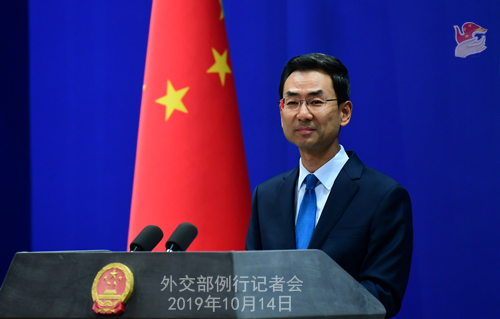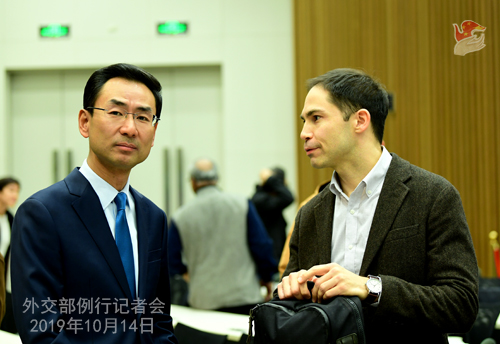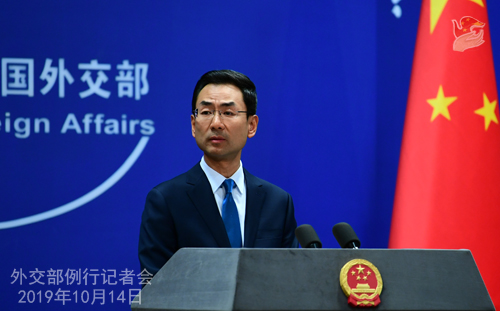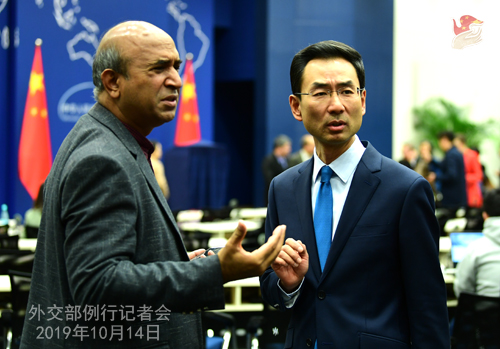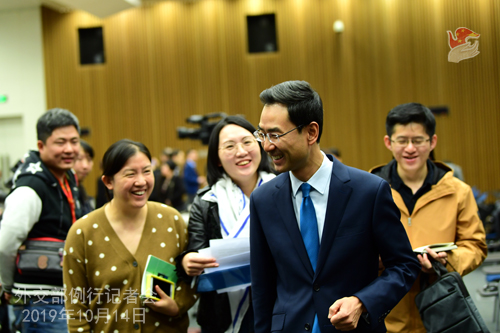| Foreign Ministry Spokesperson Geng Shuang's Regular Press Conference on October 14, 2019 |
| 2019-10-14 22:07 |
|
Invited by the Indonesian and Japanese governments, President Xi Jinping's special envoy and Vice President Wang Qishan will visit the two countries and attend President Joko Widodo's inauguration ceremony on October 20 in Jakarta, Indonesia and Emperor Naruhito's enthronement ceremony on October 22 in Tokyo, Japan. Invited by head of Brazil's Institutional Security Office Augusto Heleno, Yang Jiechi, member of the Politburo of the CPC Central Committee and Director of the Office of the Foreign Affairs Commission of the CPC Central Committee, will attend the ninth Meeting of BRICS High Representatives for Security Issues from October 17 to 18 in Brasilia, Brazil. Q: What expectations does China have for the ninth Meeting of the BRICS High Representatives for Security Issues? A: The BRICS mechanism is an important platform for emerging markets and developing countries to step up solidarity and cooperation and uphold shared interests. In recent years, under the strategic guidance of the BRICS leaders, the BRICS countries, following the BRICS spirit of open, inclusive and win-win cooperation, promoted in-depth practical cooperation in various fields, deepened solidarity and mutual trust and enhanced the well-being of their people, setting a model of a new type of major country relations. The Meeting of the BRICS High Representatives for Security Issues is a strategic platform to strengthen political and security cooperation between the BRICS countries and this ninth meeting is an important event ahead of the BRICS Leaders Meeting in Brasilia in November. Facing complex and severe international situation, the BRICS countries will exchange in-depth views on international security situation, major international and regional hotspot issues and bolstering cooperation on counterterrorism and cyber security, make joint efforts to address prominent challenges, uphold their security and development interests and safeguard world peace and stability. China believes that this meeting will achieve positive outcomes, deepen strategic mutual trust among BRICS countries and make political preparations for the upcoming BRICS Leaders Meeting in Brasilia in November.
Q: I have two questions about the trade talks in Washington last week. The US says China agrees to buy 50 billion dollars worth of US agricultural goods annually. I wonder if China did indeed agree to do that? The US and China have had agreement or close agreement in the past and those agreements have failed or are falling apart, so is China confident that this phase one agreement will last? A: As to the latest round of China-U.S. high-level economic and trade consultations, the Chinese side has issued the press release. The two sides had candid, efficient and constructive discussions on trade and economic issues of mutual concern in this round of consultations and made substantive progress in such areas as agriculture, intellectual property rights protection, exchange rate, financial services, expanding trade cooperation, technology transfer and dispute settlement. The two sides also discussed the arrangement for negotiations going forward and agreed to work towards making a final deal. We hope the US will meet China halfway and work together following the principle and direction determined by the two heads of state, properly address each other's concerns on the basis of equality and mutual respect and promote the healthy and steady development of our trade and economic relations. Q: Typhoon Hagibis slammed into Japan and caused major casualties and property losses, with many still missing. What's your comment? A: China is concerned about the severe typhoon disaster in Japan. We mourn for the victims and extend sincere sympathies to the bereaved families and the injured and hope the people in disaster-stricken areas will resume normal life and work at an early date. Q: This morning Beijing time, US President Trump tweeted that China has already begun buying US agricultural products. Can you confirm that? Or is it just the statement of Trump or the US? A: I just gave my response regarding the latest round of China-U.S. high-level economic and trade consultations. As for the specific question, I'd like to refer you to the competent authorities.
Q: Yesterday President Xi concluded his visit to Nepal. It is the first visit by a Chinese president in 23 years. Both sides signed cooperation agreements and also stressed the BRI and multilateral cooperation. Do you have any comment on that? A: Since China and Nepal established diplomatic relationship, our two countries have been respecting, trusting and supporting each other, making this relationship an exemplar of harmonious co-existence between countries of different sizes. President Xi's visit to Nepal was the first visit conducted by a Chinese president in 23 years' time. The two sides issued a joint statement and signed 20 cooperation documents. The outcomes of this successful visit can be concluded in three parts. First, the bilateral relationship was elevated to a new height. Following the spirit of sharing weal and woe as well as win-win cooperation, the two sides jointly announced the decision to upgrade the bilateral relations to a strategic partnership of cooperation featuring ever-lasting friendship for development and prosperity. This new definition charts the course for future development and gives China-Nepal relationship greater influence in the region. Second, new progress was made in connectivity. Both sides agreed to create synergies between bilateral cooperation under the Belt and Road Initiative and Nepal's national policy of developing a land-linked state. The two sides will advance the construction of the trans-Himalayan Multi-Dimensional Connectivity Network in areas of ports, highways, railways, aviation and communication. Both sides also launched the feasibility study of a cross-border railway, which is a major progress in linking the two countries by transportation despite difficult natural conditions. Third, new outcomes were achieved in cooperation featuring good-neighborliness and friendship. China and Nepal agreed to conduct all-dimensional cooperation, especially in trade and investment, post-earthquake reconstruction, energy and tourism. The two sides also agreed to bring our two peoples closer by expanding exchange and cooperation in education, youth and on the sub-national level. As Mount Qomolangma is a symbol of China-Nepal friendship, the two sides will cooperate in climate change and eco-tourism related to Mount Qomolangma, making these projects a new highlight in our bilateral cooperation. China is ready to work with Nepal to implement the consensus of our leaders, scale new heights in our friendly cooperation and open a new chapter for bilateral relations.
Q: China Chamber of Commerce to the EU (CCCEU), based in Brussels, launched its first flagship report on 11 October, which summarized Chinese companies development in Europe and recommended to improve business environment in EU for the EU institutions and EU state governments. I wonder if you have a comment on that? A: We noted the Report on the Development of Chinese Enterprises in the EU issued by the CCCEU, the chamber's first flagship report after its establishment in Brussels in 2018. We are glad to see that Chinese enterprises generally operate well in Europe, with more Chinese companies establishing R&D centers and factories there. Their investment and cooperation have contributed to employment and livelihood of the local communities as well as the upgrade of Europe's industrial chain in a multi-dimensional way. However, on the other hand, the report noted many worrying challenges and restrictions that Chinese enterprises face, such as limited access of Chinese companies due to the increasing censorship of foreign investment by the EU, restrictions on SOEs and the development of Chinese companies in science, technology, energy and certain areas, insufficient communication between Chinese enterprises and local governments, etc. Europe has always been an advocate of market economy and trade and investment liberalization and facilitation, and a supporter and guardian of multilateralism and free trade. We hope the EU side will heed the opinions and demands from the Chinese enterprises, continue to keep its investment market open, and foster a business environment that is fair, transparent, stable and predictable for all foreign companies in Europe including Chinese ones. Under the current circumstances, following the spirit of mutual respect and win-win outcomes, it is important for China and the EU to remain open and inclusive and expand cooperation, which will benefit both and inject greater stability and positive energy into the world. Q: Regarding Vice President Wang Qishan's visit to Japan, will he meet with Prime Minister Abe and other leaders? Can you tell us the plans and arrangements for his visit? A: As I said earlier, Vice President Wang Qishan is to attend Emperor Naruhito's enthronement ceremony as President Xi Jinping's special envoy. During his visit to Japan, he will be meeting with the Japanese leadership and representatives from various sectors. As I know, besides Tokyo, Vice President Wang will also visit Hokkaido. Q: Further to what you said about Nepal, there were expectations of an extradition treaty to be signed during President Xi's visit, can you outline the reasons why it wasn't? A: China attaches importance to judicial cooperation with Nepal. Both sides are pleased with the signing of a treaty on mutual legal assistance in criminal matters during this visit. We hope an extradition treaty will be concluded at an early date. Q: As we note, Tencent returned some NBA preseason games to streaming status. Does the Chinese government support this move and what is your comment on it? A: I believe you are aware that we generally do not comment on the business behaviors of companies. I'd refer you to the company if you are interested in this matter. Sports exchange has played a positive role in China-US relations and friendship. In the meantime, as I said before, an important prerequisite for exchange and cooperation is mutual respect. It is true in China, in the US and everywhere else.
|
 |
|
